The accountancy industry is undergoing a significant transformation as artificial intelligence (AI) becomes an essential tool for enhancing efficiency and accuracy.
With AI automating routine tasks such as data entry, bookkeeping, and basic financial analysis, accountants are now able to focus on more strategic and value-added activities.
This shift is not just about improving productivity; it is also redefining the role of accountants, making it crucial for professionals to adapt to these changes by developing skills that complement AI.
Former Dragons’ Den investor and global AI expert Piers Linney has called upon City accountancy firms to embrace and ready themselves for crucial automation changes.
“AI is revolutionising the accountancy profession,” explained Linney.
“It’s automating repetitive and time-consuming tasks such as data entry, reconciliation, and basic financial analysis.
“This shift is significantly reducing the need for entry-level positions traditionally focused on these tasks.
“However, as AI takes over routine work, the role of accountants is evolving.
“To stay relevant, accountants must now pivot towards areas that require human expertise, such as strategic decision-making, client advisory services, and managing complex financial scenarios.
“These are traditionally tasks where human judgment, creativity, and nuanced understanding are indispensable.
“Embracing these new roles will be crucial for accountants as our future
becomes more AI-driven.”
What are the main benefits of AI in accountancy?
“Accountancy has experienced significant benefits from the rise of AI, especially by automating routine tasks which is freeing up accountants for higher-value work.
“It also improves accuracy by reducing human errors, which in-turn leads to more reliable financial reporting.
“AI’s advanced data analysis capabilities also provide deeper insights,
which I’ve seen help accountants massively in making more informed decisions.
“I also believe a huge benefit to automation in accountancy is that it can process large volumes of data quickly, enabling faster turnaround times for financial tasks.
“It supports better compliance by automatically updating and applying the latest regulations and standards.”
Are there any particular risks for AI in accountancy which City firms need to be aware of?
“Of course, AI has presented the world of accountancy with a few risks that do need careful consideration.
“One concern we see a lot is data security, as AI systems handle sensitive financial information, making them targets for cyberattacks if the correct measures aren’t put in place internally.
“However, I believe the main risk that we’re currently seeing is models making mistakes such as hallucinations, where the system generates information that isn’t based on real data.
“This may be down to limitations or generalisations, but this is being developed out of the models over time.
“Ethical issues also arise around bias in AI algorithms, which could lead to unfair treatment in financial decision-making.”
Embrace Technology & AI In Your Business | Champions (UK) plc (championsukplc.com)
Written by Piers Linney, AI and Technology Lead at business growth consultant Champions (UK) plc.
For the latest headlines from the City of London and beyond, follow City Matters on Twitter, Instagram and LinkedIn.







